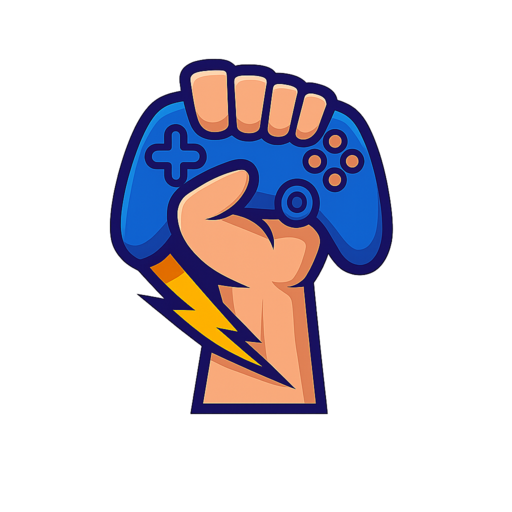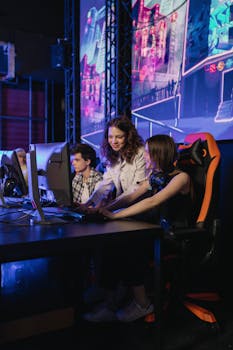Anúncios
If you’ve lingered in a gaming lobby or read live chat, you’ve stumbled onto gamer slang—language that can sound wild, funny, or even baffling to newcomers.
Gamer slang and expressions have evolved into an entire dialect bridging cultures and generations of players, building trust and instant understanding, and shaping how communities communicate online or offline.
This article invites you to decode the evolution of gamer slang, spot key expressions, and see how these shared words build a powerful sense of identity across gaming worlds.
Tracing Roots: The Earliest Origins of Gamer Jargon
Understanding the first steps of gamer slang helps you recognize why even old expressions stick around. These roots anchor today’s lingo in nostalgia and digital history.
Before MMORPGs or esports, early arcade crowds swapped phrases like “1UP” and “noob.” This early gamer slang emerged from mechanical pinball and coin-op machines, blending technical terms with streetwise flair.
Arcades and the Social Playground
In 1980s arcades, players showed off with “high score” and “GG” after a match ended. Using these phrases became a badge of honor, helping people mark skill and camaraderie in busy scenes.
Kids would call a “quarter up” to declare their spot on the next game, a sign of playful competitiveness. This simple move shaped ritualized language among regular players.
When someone shouted “Game Over!” it was part warning, part encouragement. Using the phrase in a real-life scenario created an instant buzz, a clue you’d stepped into a gaming world.
Transition to PC and Console Chat
With the arrival of home consoles, gamer slang adapted. The word “save point” entered daily chats, teaching friends how digital experiences shaped real conversations.
On early message boards, acronyms like “AFK” and “BRB” made games more accessible, letting players step away but remain part of the group. These shorthands simplified communication.
Kids on playgrounds would say, “Let’s respawn at the swings!” Borrowing gamer slang, they wove virtual expressions into analog play, softening the boundaries between real and digital.
Table: Old and New Expressions Compared
| Vintage Slang | Modern Equivalent | Game Origin | What to Try |
|---|---|---|---|
| Noob | Bot | FPS games | Test the term in casual chat to spot new gamers |
| 1UP | Level up | Platformers/MMOs | Say “level up” after mastering a skill to encourage friends |
| GG | EZ | Competitive matches | Use “GG” for sportsmanship, “EZ” to joke playfully—but read the room |
| AFK | BRB | Chat rooms/MMOs | Announce “AFK” instead of leaving chat abruptly to show respect |
| Frag | Takedown | FPS games | Tell teammates “nice takedown” after a strong play for team morale |
Shape-Shifting Slang: When Old Words Take On New Meanings
As gamer slang evolves, familiar phrases gain new meanings depending on the game or community. Recognizing these subtleties helps you decode club-style language on your own terms.
For example, “camping” meant one thing in Doom—a defensive strategy—but in multiplayer shooters today, it can spark heated debates or inside jokes.
Evolution in Real-Time Conversations
“Tilt” isn’t just frustration. In League of Legends, gamers use “tilted” to signal lost focus or frustration after repeated defeats. This flexible use keeps slang relevant as games change.
- Say “on tilt” after a tough loss to signal you’re taking a breather, which helps teammates adjust expectations and offer support, avoiding unnecessary conflict.
- Swap “OP” for “broken” when chatting about game balance. It shows you keep up with latest trends and recognize the context where each term fits best.
- Adopt “nerf” or “buff” when discussing game updates. Players rely on these words to explain patch effects, making feedback easier and less emotional.
- Use “meta” in discussions about new strategies. It means you’re aware of community consensus and want to build smarter playstyles, not just personal tactics.
- Say “hard carry” to highlight someone’s outstanding performance. This celebrates individual achievement while acknowledging teamwork, promoting positive reinforcement.
Integrating evolving expressions can help you fit in with any group, letting you sense unspoken rules faster and save face after mistakes.
The Layered Meanings of LFG
When a player types “LFG” in chat, they could be looking for a raid team, a fast match, or just friends to talk with. Adjusting your response signals attunement to their goal.
- Post “LFG fast run” if you want a quick match, so others know you’re not looking for a long grind.
- Join “LFG chill” groups when socializing is the main draw, not strict performance—don’t tryhard here, bring jokes or stories instead.
- In game forums, write “LFG competitive” if you’re searching for ambitious teams, setting expectations for skill level and play frequency upfront.
- Invite new players with “LFG teaching” to offer help; use patient language in chat, and expect slower game pace as you answer their questions.
- Suggest “LFG memes” when gathering people for silly or experimental challenges, keeping a light tone and welcoming playful banter.
Understanding the nuances behind gamer slang like “LFG” lets you build communities on your terms, making interactions smoother and more rewarding.
Memes and Viral Trends in Modern Gamer Conversations
Players who recognize the creative flow of gamer slang see memes and viral catchphrases morph into daily conversation, shaping humor and establishing shared identity almost overnight.
From “pogchamp” to “sus,” meme-inspired slang transforms regular chat into inside jokes, helping groups identify “in the know” members quickly, while leaving outsiders puzzled.
From Twitch Emotes to Spoken Language
When “Pog” jumped from a Twitch emote to face-to-face enthusiasm (“Pog moment!”), it revealed gamer slang’s power to leave digital spaces and shape how friends react IRL.
Offline, players may mimic in-game reactions, like pretending to “yeet” a controller across a couch after a digital loss. These gestures build connection long after logging off.
Gamers nod or smirk at phrases like “big brain play” during board games or exams. The original slang becomes a badge of shared wit, leveling up group conversation everywhere.
Evolving the Joke: “Among Us” and Cultural Crossovers
When “sus” exploded after Among Us, it migrated to mainstream chatter. Teenagers call out “that’s sus” during debates, echoing in-game suspicion outside the app.
Meanwhile, “venting” carries layered meanings: specific to the game, but relatable enough to describe backstabbing in sports or at school, showing how gamer slang adapts.
Parents overhear kids whisper “impostor vibes” and catch on, realizing a new language of suspicion and trust has replaced yesterday’s “liar!” or “cheater!” for the next generation.
Community Rules: Politeness, Trolling, and Group Customs
Every thriving gaming group depends on unwritten rules. Knowing when to drop “GG” or avoid certain words can prevent misunderstandings, build mutual trust, and maintain harmony among all skill levels.
Gamer slang like “salty,” “tryhard,” or “smurf” helps players spot prevailing moods or call out unwelcome behavior, creating opportunities for gentle course correction or light-hearted ribbing.
Building Trust with Shared Etiquette
Dropping a quick “GLHF” (“Good luck, have fun”) at the start is standard in team-based games. This automatic salute signals good sportsmanship and relieves tension during tense matches.
Players know when someone types “GG EZ” at the end, it’s a joke or a feisty barb depending on the delivery. Reading tone is key; misuse can spark drama or friendly banter alike.
To prevent flame wars, switch to “nice try” after a tough loss. It keeps morale high and attention on improvement. This tiny swap in gamer slang boosts team spirit instantly.
Spotting and Stopping Unfriendly Lingo
When someone calls another a “griefer,” it points to disruptive play. Naming the behavior with precise gamer slang gives group leaders a clear script for redirecting focus toward positive play or removing troublemakers if necessary.
Words like “carried” or “feed” carry bite. When overused, they discourage new players or fuel rivalries. Replace them with encouragements or advice, like “let’s regroup” or “try adjusting your gear.”
Leaders can set tone by banning toxic phrases, using reaction emotes, and modeling new expressions that reinforce group values. This fosters an inclusive, resilient clan culture.
Influence Beyond the Screen: Gamer Slang in Daily Life
Once confined to pixels and chat logs, gamer slang seeps into lunch breaks, sports teams, and group projects. Spotting these crossovers gives you a language advantage wherever you go.
Saying “AFK” or “GG” after a busy shift signals you’re ready for downtime. It helps coworkers bond and adds a splash of personality distinct from corporate jargon or scripted talk.
Analogies That Reshape Dialogue
Kids treat playground games like strategy titles, calling out “respawn” or “boss fight” during tag or dodgeball. These analogies help younger gamers explain strategies to adults or new friends, bridging the world of imagination and teamwork.
When teens blurt “OP” while discussing group projects, it identifies powerhouse contributors or shines a new light on classroom pecking orders, letting everyone share a laugh or set team roles quickly.
At family dinner, saying “nerfed my dessert” after it shrinks gives everyone a giggle. Such expressions make stick-in-the-mud traditions feel fresh and engaging for all ages.
Table: Slang Across Different Contexts
| Gamer Slang | In-Game Use | Real-World Use | Action to Try |
|---|---|---|---|
| AFK | Stepping away from keyboard | Leaving a meeting or class | Announce “AFK” when stepping out and watch for grins |
| GG | End of game applause | High-fiving after teamwork | Say “GG” after a big group win or project finish |
| OP | Calling an item or hero overpowered | Describing a star student or athlete | Use “OP” for praise in friendly boasting |
| Buff/Nerf | Tracking changes in game updates | Replying to policy or work changes | Joke about a “buffed” coffee or “nerfed” lunch |
| Noob | Referring to new gamers | Playful ribbing of inexperienced friends | Use with a smile to keep it friendly, not offensive |
Future Waves: Predicting the Next Big Expressions
With streaming, social media, and mobile platforms accelerating communication, gamer slang mutates faster than ever. Learning to ride this wave means you can join new trends as they unfold and expand your digital vocabulary.
TikTok remixes and Discord bots now birth ideas, transforming a clever phrase into a viral shorthand worldwide overnight. Keep your ear tuned to spot tomorrow’s trending gamer slang as it emerges.
Anticipating Changes in New Games
Developers shape slang through patch notes, memes, and influencer communities. New releases like open-world RPGs or auto-battlers might launch catchphrases—“dropped loot” or “hard reset”—for unique moment-to-moment events.
Watch for the rise of fandom-specific lingo, blending game names and verbs, such as “Valheiming” for grinding resources or “speedrunning life” as a daily motto. These hybrids stick with fans long-term.
Younger players adapt slang for schoolwork or home life, making digital humor part of classroom energy or chitchat with parents. Observing these trends keeps your language toolkit sharp and timely.
Staying Flexible: Evolving alongside Games
Gaming communities innovate fast. Pick up new expressions by lurking in forums, following meme accounts, or playing with younger teammates. Add a phrase to your chats as a trial run and tweak your style based on reactions.
Embrace mistakes and ask for clarification when you hear mystery slang. Use direct questions like “What does cracked mean?” It shows you’re willing to learn and makes group bonding easier.
Recognize gamer slang as a living language. Like regional dialects or code words in sports, expressions bloom and fade, but each era leaves a trace—preserve your favorites, and share them with new friends.
Lifelong Impact: Why Gamer Slang Matters Everywhere
Gamer slang’s journey mirrors player growth. From arcade basics to emoji-loaded chat, each word, inside joke, or playful jab strengthens camaraderie, eases communication, and bridges digital with daily life across all ages and backgrounds.
Keeping up with fresh expressions and understanding classic ones provides a social edge. It lets you connect smoothly, decode jokes quickly, and inspire confidence in both virtual and real-world groups.
Embracing the evolving language of gamers guarantees you’ll never feel left out, no matter where you play—or how fast the next big slang trend appears. Keep learning, keep sharing, and enjoy every game on your way.



